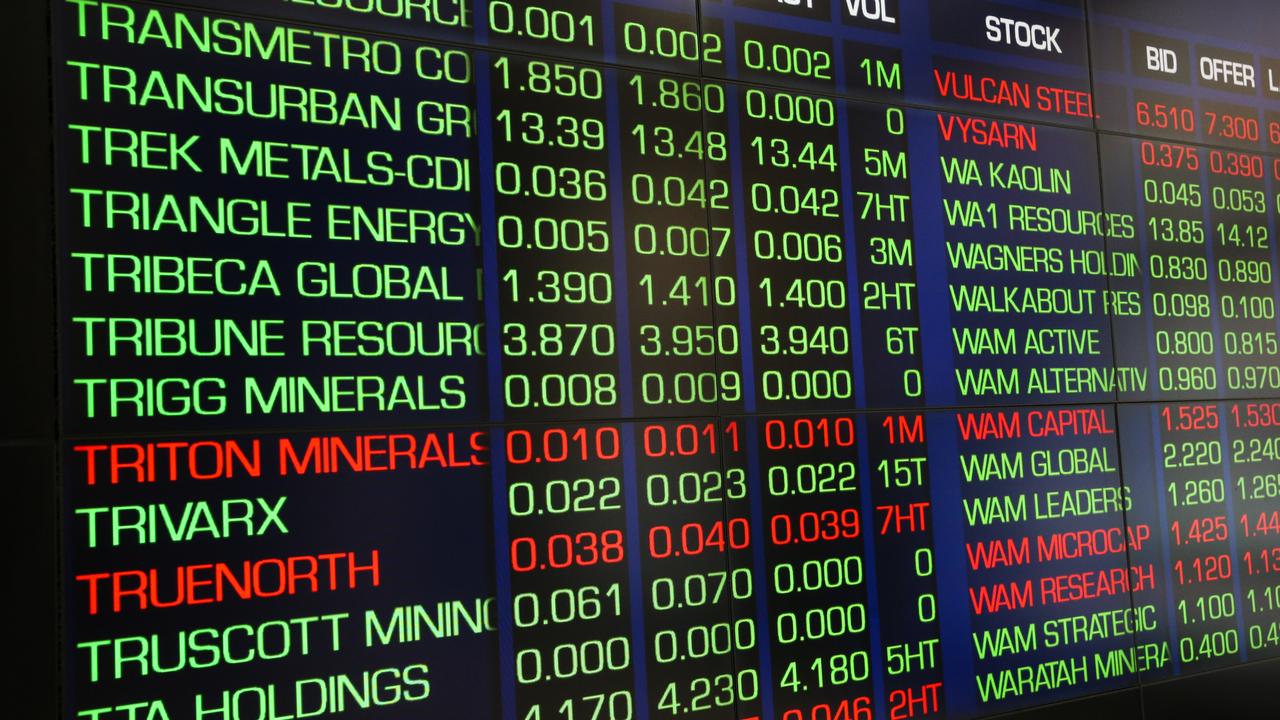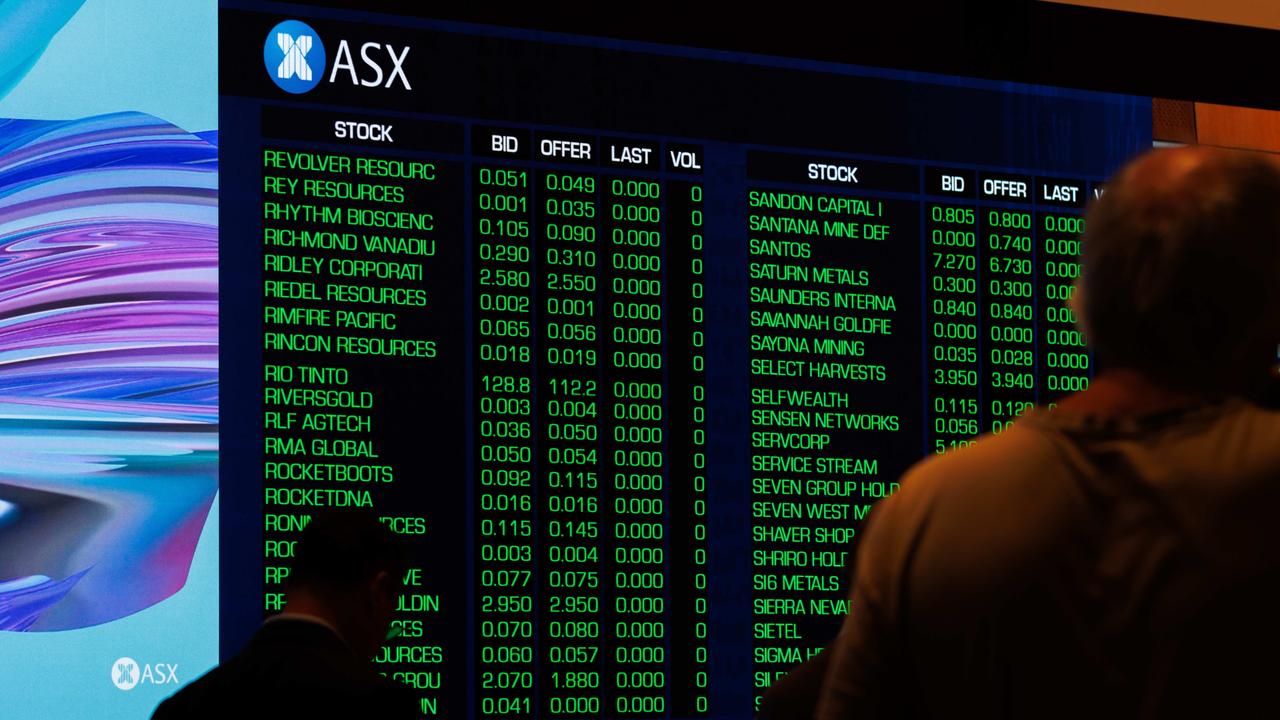Trading Day: ASX closes down to end positive week
ASX closes lower, while Lynas jumps on a US deal and retail sales worse than expected.
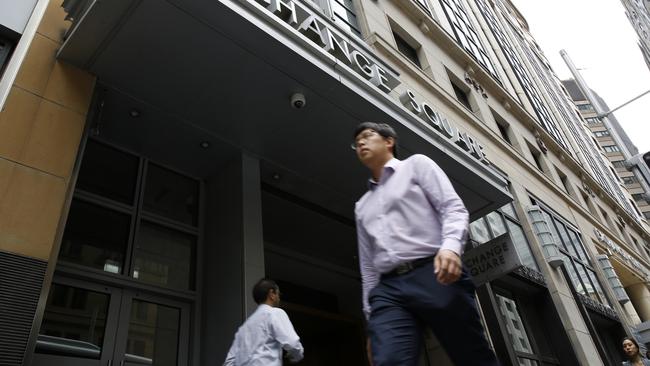
That’s all from the Trading Day blog for Friday, January 22. The Australian market fell amid bearish leads for Wall Street after it was narrowly supported by Technology and Consumer Discretionary stocks. New figures showed a fall in retail sales in December, while tech giants Google and Facebook faced a Senate hearing, which was on The Australian’s tech live blog.
6.18pm: Listen to The Money Cafe podcast
Alan and James return to Saporito for the first Money Café of 2021.
It’s the year of the electric car, but Money Cafe also discusses the future of the office REIT, the flying Aussie dollar and the heavyweight comparison between Afterpay and Tesla.
Send your own questions to James Kirby and Alan Kohler via moneycafe@theaustralian.com.au
5.45pm: Have RV, will travel
Corporate leaders benefiting from a domestic tourism boom believe the pandemic is creating a customer base that will remain loyal long after the borders reopen.
Founder and owner of RV and caravan manufacturer Jayco Gerry Ryan told The Weekend Australian that after an initial Covid-19 scare, his business – which has revenues in excess of $500m per year – is performing better than it was before the pandemic.
“Since May and June we have seen continuous growth and we’re currently running about 35 per cent higher the previous year in sales,” Mr Ryan said.
“For the 2020 calendar year we finished with 10,600 units produced, and that was with eight weeks out of production, so this year our budget is 13,800 units.”
Mr Ryan said the biggest sales increases were in states less impacted by the pandemic, but the business has been performing well and attracting a younger demographic.
“If you take each state, the big lift was certainly in Queensland and WA,” he said.
“But there’s people that would have looked at other alternative international holidays such as Bali and Asia and the like, who have suddenly looked around and said: ‘what we can do?’ So, they are coming into caravanning for the first time.”
This younger demographic is also proving to be a keen purchaser of caravan accessories – and pleasingly for Mr Ryan, who is part owner and founder of the Mitchelton-Scott professional cycling team, bike accessories are top of the list.
4.40pm: ASX ends -0.3% on profit taking
Australia’s sharemarket broke a three-day winning streak amid profit taking after strong gains as Wall Street looked vulnerable to a pullback.
The S&P/ASX 200 index closed down 0.3pc at 6800.4 after falling steadily to an intraday low of 6794.1.
The Australian market fell amid bearish leads for Wall Street after it was narrowly supported by Technology and Consumer Discretionary stocks following strong gains of late.
Thursday’s 1.4pc rise in the S&P 500 was its best inauguration day rise in 35 years and a 13.3pc rise since the election was its strongest on record.
S&P 500 futures fell 0.3pc in APAC trading with WTI crude oil futures down 1.3pc and Intel and IBM down 7.3pc and 4.7pc respectively in afterhours trading after their reports early Friday.
Technology was the biggest drag on the Australian market for a change as Afterpay fell 5.2pc and Zip Co reversed an intraday rise after strong gains of late.
The Energy sector fell almost 2pc on the back of oil prices and iron ore miners including BHP, Rio Tinto and Fortescue fell about 2pc.
Weekend profit taking extended to banks with NAB down 0.7pc after the sector hit an 11-month high on Thursday when Morgan Stanley upgraded its view.
Focus turns to global PMI data due overnight.
2.04pm: ASX down 0.4pc amid weak US leads
Australia’s share market has continued to slip, with the S&P/ASX 200 falling 0.4pc to 6798.3 amid weak leads for Wall Street.
Energy may be among the weakest US sectors on Friday as WTI crude futures have fallen 1.2pc to $US52.49 a barrel in APAC trading.
But Dow components IBM and Intel were down 7.3pc and 4.7pc respectively in afterhours trading after reporting early Friday.
They’re driving 0.3pc falls in DJIA, S&P 500 and NASDAQ futures.
Such modest falls in US futures often turn out to be better indicators that the US market will actually close in the red.
The S&P 500 has risen 3 days in a row, with the strongest inauguration day rise in 35 years and the strongest election-to-inauguration-day rise on record.
1.50pm: Energy leads ASX fall as crude slips
The Energy sector is leading Australian share market falls today with Santos down 3pc and Woodside, Origin, Oil Search and Beach also down more than 2pc.
WTI crude oil futures fell 1.2pc to $US52.49 in APAC trading after US President Biden warned of another 100,000 US deaths from COVID over the next month and data showed NY traffic slowed from a month ago and as renewed lockdowns continue in China.
WTI hit a 12-month high of $US53.93 earlier this month after Saudi Arabia pledged unilateral output cuts which eased market concerns about oversupply.
The S&P/ASX 200 fell as much as 0.3pc in mid-afternoon trading, hitting an intraday low of 6800.5.
Eli Greenblat 1.30pm: Funtastic sells out of confectionery
Funtastic, which has gone through countless incarnations in the retail sector, has sold off its confectionary business to focus on its new investments in retail chain Toys R Us and Hobby Warehouse following a backdoor listing of the twin businesses late last year.
The confectionary arm has been sold to Sweet Season for $1.05 million. The sale means Funtastic has rid itself one of the last remaining businesses it inherited from the last two decades of sprawling retail businesses including toys, film distribution and vacuum cleaners.
Funtastic said the sale was part of a strategic overhaul, including expansion of its e-commerce business.
The sale price comprises current inventory and all other assets of the confectionery business including confectionery brand names and other intellectual property.
Revenue from confectionery in the year to July 2020 totalled $4.2m, or 17 per cent of Funtastic’s total revenue for the year.
12.08pm: Stocks dip amid caution
Australia’s share market was slightly weaker at midday amid caution following strong gains in recent months.
The S&P/ASX 200 was down 0.2pc at 6810 after hitting an 11-month high of 6829.3 on Thursday, following a euphoric US share market reaction to Joe Biden’s inauguration.
NASDAQ and DJIA futures slipped 0.2pc with Intel down 4.7pc and IBM down 7.3pc in after-hours trading after their profit reports.
Both the S&P 500 and NASDAQ could form “Evening Star” reversal patterns if they fall sharply on Friday.
The Australian share market sectors were split between gains in Health Care, Discretionary, Staples and Communications, and falls in Energy, Tech, Utilities, Financials, Materials and Industrials.
Santos fell 2.3pc as crude oil prices wavered after a strong bounce, while iron ore miners, buy-now-pay-later and bank stocks appeared to be hit by profit-taking.
BHP fell 1.4pc after hitting a record high last Friday, Afterpay fell 4pc after hitting a record high on Thursday, Zip Co fell 4pc after rising 15pc this morning and 24pc on Thursday, and NAB fell 0.8pc after jumping 1.6pc on Morgan Stanley’s upgrade on Thursday.
Lynas surged 15pc on a US Defense contract win, Fisher & Paykel Healthcare jumped 6pc on a strong trading update and CSL rose 2.6pc after Citi upgraded, while Wesfarmers, Stockland and South32 rose more than 2pc.
11.55am: Intel earnings better than expected
Intel said earnings topped prior expectations, as the computer chip giant faces pressure to come up with bold ways to fend off fierce competition and an activist shareholder.
Intel said it took in $US20 billion in revenue during the final quarter of last year, little changed from a year earlier, amid robust sales of personal computers.
The Silicon Valley company reported net income of $US5.9 billion in the quarter, down a billion dollars from the same period a year earlier.
Intel said that its board approved an increased cash dividend of $US1.39 per share in what may have been a move to placate investor Dan Loeb of Third Point, who has called on Intel to bolster its weakening position in the chip market.
“We significantly exceeded our expectations for the quarter, capping off our fifth consecutive record year,” outgoing chief executive Bob Swan said in the earnings release.
Revenue for the full year hit $US77.9 billion, a record, the company said. Swan will step down on February 15, yielding the Intel helm to Pat Gelsinger.
AFP
Ben Wilmot 11.54am: Colliers names new CEO
Real estate firm Colliers International has tapped industrial property veteran Malcom Tyson to become chief executive of its Australian branch.
Tyson has been a senior member of Colliers’ Australasian leadership team since 2005 and has led a number of businesses.
He will take over the position of CEO from John Kenny, who was appointed as CEO of the firm’s Asia Pacific unit at the beginning of 2020 after 15 years in the Australian role.
“Malcom is a proven, disciplined and trusted leader. He brings more than 30 years of real estate and business experience to the position and is regarded as a leader within the Australian property industry,” Mr Kenny said.
Mr Tyson was CEO of the business in NSW and managing director of the Australian industrial business.
Ben Wilmot 11.46am: UBank shakes up home loans with rate cut
Digital bank UBank has stirred up the home loan market by slashing its three-year fixed home loan rate for owner occupiers paying principal and interest to 1.75 per cent.
Property companies consider lower rates a key driver of the home market, while many analysts believe that activity is mainly being driven by government stimulus packages.
The rate represents the bank’s lowest ever advertised interest rate and comes as forecasters prepare for an extended period of very low rates, which has prompted forecasts that asset prices will rise by as much as 30 per cent over coming years.
UBank CEO Philippa Watson said the company was committed to providing sharp rates to its home loan customers.
Since late May, UBank has more than halved its fixed interest rate on its three-year owner occupier (principal and interest) loan, from 3.59 per cent to 1.75 per cent per annum.
This decrease in the rate has the potential to save customers $465 per month in interest payments and $16,740 over the full 3-year fixed term, on a $480,000 owner occupier loan paying principal and interest.
UBank has also reduced all other fixed rates between 0.15 and 0.35 per cent per annum, with major banks expected to respond as they are keen to grow market share.
11.40am: Retail sales worse than expected
Australia’s seasonally adjusted retail sales dived 4.2pc in December, according to a preliminary estimate by the Australian Bureau of Statistics.
The fall was almost three times worse than a 1.5pc fall expected by economists, but the Australian dollar is unchanged, because the data have been particularly volatile since to COVID-19.
Falls were recorded in five of the six retail industries, led by household goods retailing, says ABS director Ben James.
Household goods retailing, other retailing, department stores, and clothing, footwear and personal accessory retailing, fell after large rises in November, when sales were underpinned by an easing of restrictions in Victoria, new product releases and Black Friday sales.
Food retailing also fell in December, as COVID-19 restrictions limited household gatherings in some states and territories.
Cafes, restaurants and takeaway food services was the only sector to rise.
Victoria led the falls by state, down 7 per cent following a 22 per cent rise in November, while New South Wales fell 5 per cent as localised restrictions in Sydney impacted turnover. All states and territories, except for the Northern Territory, fell this month.
But there was a 2.4 per cent increase for the December quarter in current price, seasonally adjusted terms after a 7pc rise in the September quarter.
Quarterly volume estimates will be included in the final retail trade release on February 5.
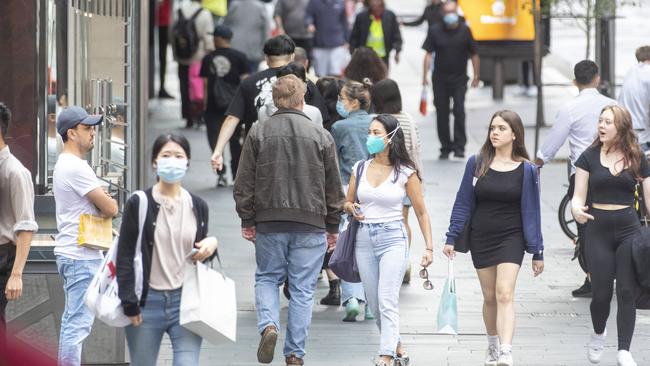
11.34am: Bitcoin drops below $US30,000
Bitcoin has dropped below $US30,000 for the first time since early January.
The price has fallen 30pc from a record high of $US41,981 on January 8 to an almost 3-week low of $US29226.99.
Bitcoin is down 6pc today after falling 11pc on Thursday and 4pc on Wednesday.
11.33am: Aussie Broadband stock fires up
Shares in newly-listed Aussie Broadband were up more than 16 per cent after it released figures that show residential broadband connections are up 30 per cent in the December half and business connections are up 49 per cent.
The junior telco says it now expects its half year EBITDA to be in the range of $6.9m to $7.4m. At this rate it puts it on track to beat its October prospectus forecast FY21 EBITDA of $12.66m.
The company will release its half year results on February 17.
At 11.30 (AEDT) Aussie Broadband was up 16.6 per cent at $2.88.

11.24am: Perpetual shares down after update
Perpetual shares fell 4.4pc to a four-week low of $34.31 after reporting fund outflows in its business update.
The fund manager’s PAMA Australian assets under management fell 2pc to $22.7bn in the December quarter.
But the outflow was mainly driven by a $1.7bn outflow from a low-margin institutional “enhanced cash” mandate, largely offset by $2.2bn growth in asset values amid improved market conditions and a strong performance from Australian equities in particular.
International (PAMI) division, created by the November acquisition of Barrow Hanley, had AUM of $66.5bn as of end-December.
Perpetual Corporate Trust saw funds under administration rise 1pc to $936,2bn.
CEO Rob Adams noted that a rotation to value stocks in the past quarter helped the fund manager’s performance relative to benchmarks across PPT’s Australian equity funds in particular
10.38am: ASX dips; resources and financials weigh
Australia’s share market dipped as expected then rebounded in quiet trading, after Wall Street stalled.
The S&P/ASX 200 fell 0.3pc to 6810.7 before recovering to be down just 4 points at 6821 in quiet trading.
Falls in the Energy, Materials, Financials, Technology, Real Estate and Industrials sectors outweighed gains in Health Care, Consumer Staples, Consumer Discretionary and Utilities sectors.
The top five drags on the index included BHP, Rio Tinto, Macquarie, Afterpay and Santos, the latter falling 2.6pc,
The main drags on the index included a 1.2pc fall in BHP. Among the biggest points falls were Santos, down 2.7pc, while ANZ slipped 0.4pc, Afterpay fell 3pc, Scentre fell 1.1pc.
But CSL jumped 2.2pc after being upgraded to Buy at Citi, Lynas surged 8.5pc on a US defence contract win, Zip Co was up 7pc after surging 15pc following Thursday’s 23pc surge, and Fisher & Paykel Healthcare rose 7pc after revenue rose 73pc in the 9-months to December.
10.38am: Lynas surges 8 per cent on US plant
Shares in rare earth producer Lynas Corp surged on Friday after it said it will build a $US60m processing plant in Texas to produce rare earth products for the US government’s strategic stockpiles, with the US Department of Defence to pay for half of the facility.
The light rare earths plant will produce about 5000 tonnes of product, about a quarter of the current nameplate capacity of its existing processing facilities in Malaysia.
Lynas did not put a time frame on construction of the plant, nor give any details of feasibility studies on whether it would deliver a commercial return for Lynas shareholders.
Lynas shares climbed as much as 7.8 per cent in early trading, to $5.27, its highest levels since June 2013, after closing Thursday at $4.89.
10.11am: GOP pushes back on stimulus
A few Republican senators have pushed back against President Biden’s $US1.9 trillion ($2.46 trillion) COVID-19 relief plan.
“It’s hard for me to see when we just passed $US900 billion of assistance why we would have a package that big,” Republican Senator Susan Collins said early Friday.
This kind of sentiment may dampen the US share market rally after a euphoric election to inauguration day rise of 14.3pc.
Biden would need support from a number of moderate Republicans like Collins to get the package through Congress.
But she and other moderates including Mitt Romney and Lisa Murkowski have also expressed misgivings about the plan, Bloomberg notes.
9.45am: ASX set to slip in likely cautious trade
Australia’s share market is expected to trade cautiously before the weekend.
Overnight futures relative to fair value suggest the S&P/ASX 200 will slip 0.2pc to 6810 after hitting an 11-month high of 6829.3 on Thursday.
A flat close on the S&P 500 on Thursday was a decent performance considering the euphoric reaction to Joe Biden’s inauguration.
A 1.4pc rise on Wednesday was the best inauguration-day rise in the US benchmark in 35 years and it capped a record election-to-inauguration day rise of 14.3pc.
There is now a chance of bearish “Evening Star” reversal patterns on the S&P 500 and NASDAQ. Those patterns would need to be completed by sharp closing falls on Friday.
There’s also some event risk later Friday with numerous MARKIT PMIs for January due to be released.
IBM is down 6.6pc in afterhours trading, which may weigh on US index futures today.
Most S&P 500 sectors fell overnight, with a surge in FAANG stocks, particularly Apple and Intel, leading gains.
Intel is down 2.9pc in afterhours trading while Apple is up about 0.4pc.
Moreover, S&P 500 leadership narrowed considerably overnight.
Energy fell sharply and Materials, Industrials, Utilities, Health Care, Consumer Staples and Real Estate fell.
9.11am: Services sector cooled in December: IHS Markit
Australia’s services sector expanded at a slower rate in January amid COVID lockdowns while manufacturing expanded at a faster rate, according to purchasing managers indices from IHS Markit.
The Flash Australia Services Business Activity Index fell to a 2-month low of 55.8 in January from a final reading of 57 in December.
The Flash Australia Manufacturing Output Index rose to a 37-month high of 57.2 in January from 54.1 in December.
The Flash Australia Composite Output Index fell to a 2-month low of 56 from 56.6.
“Aggregate new orders expanded for the fifth consecutive month, while job creation was sustained in January,” IHS Markit said.
“Although companies remained upbeat of a rise in business activity over the course of the coming 12 months, the overall degree of business confidence waned to the lowest since August.
Concerns over the lasting effects of the coronavirus disease 2019 (COVID-19) epidemic on the economy dampened positive sentiment.
At the same time, selling prices rose at the quickest rate in over two years as firms sought to share additional cost burdens with their clients.”
9.05am: Lynas to build rare earths plant in US
Lynas has sealed an agreement with the United States government to build a commercial light rare earths separation plant in Texas.
The plant is being built in collaboration with the US Department of Defence, which is expected to contribute about $US30m.
Lynas says it also expects to contribute approximately $US30 million under the
agreement.
Once operational, the plant is expected to produce approximately 5000 tonnes per annum of rare earths products. The plant will be able to receive material directly from the cracking and leaching plant that Lynas is developing in Kalgoorlie.
Rare earth materials are critical in electric vehicles, electronics and several defence applications.
8.50am: IBM pledges return to growth
International Business Machines Corp. expects to return to revenue growth this year, even as corporate customers’ focus on preserving cash during the coronavirus pandemic drove a 4.6pc revenue decline in 2020.
IBM has reported lower sales every quarter in 2020, underscoring the challenges ahead for Chief Executive Arvind Krishna, who took over during the pandemic.
In the latest quarter, revenue fell to $US20.37 billion from $US21.78 billion a year earlier.
Analysts surveyed by FactSet expected $1.81 a share in adjusted profit and $US20.68 billion in revenue.
Shares fell 6.6pc in after hours trading. IBM’s stock closed at $US131.65 on Thursday, up 1.2pc for the day but down 5.4pc over the past 12 months.
IBM, which had suspended financial projections last year over uncertainty about the pandemic’s business impact, said it expects revenue to grow this year and anticipates $US11 billion to $US12 billion in adjusted free cash flow for the year.
Dow Jones
8.45am: Fisher & Paykel revenue surges
Fisher & Paykel Healthcare Corp.’s operating revenue for the first nine months of FY 2021 was 73 per cent higher than in the same period a year earlier due to surging coronavirus-driven demand.
The New Zealand-based medical device manufacturer on Friday said the rise, which strips out the impact of currency movements, was driven by strong hardware sales and use amid elevated hospitalisation rates.
It said operating revenue from hospital products, which includes those used in acute and chronic respiratory care and surgery, grew 113pc on-year. Hospital hardware operating revenue grew 446pc and hospital consumables grew 54pc, both in constant currency, it added.
Fisher & Paykel declined to give formal FY 2021 guidance due to continued uncertainty over the spread of Covid-19 and the impact of vaccine roll-outs.
Dow Jones Newswires
Eli Greenblat 8.38am: CC Amatil forecasts 14pc earnings fall
Coca-Cola Amatil, which is currently the target of a $9.3 billion takeover offer from global bottler Coca Cola European Partners, says volumes and sales stabilised towards Christmas as the country came out of the worst months of the COVID-19 pandemic.
In a fourth quarter trading update, CC Amatil also announced it will pay back the $NZ7.2 million government COVID-19 wage subsidy it received in New Zealand
The easing of restrictions and lockdowns, especially in Victoria, helped a turnaround of CC Amatil’s flagship Australian beverage arm - which produces around two thirds of group profits - although strong “at home” consumption as people drank at home saw sales weighted to the grocery channel for CC Amatil, which typically has smaller margins.
CC Amatil said it expects to deliver fiscal 2020 ongoing EBIT (before non-trading items) of $550.7 million, down 13.9 per cent on 2019 and 2020 ongoing net profit of $340.3 million.
“We delivered a strong trading performance in the all-important fourth quarter Christmas period in both Australia and New Zealand,” said chief executive Alison Watkins.
“Whilst we are encouraged by recent trading in Australia and particularly in New Zealand, month to month volatility remains. This is particularly the case in Australia, where on-the-go (OTG) trading can vary considerably by state depending on the prevailing COVID-19 restrictions and related sentiment at any given point in time.”
CC Amatil said fourth quarter volumes for the group were down 5.4 per cent compared to the prior corresponding period, reflecting continued improvement in trading conditions in Australia and New Zealand since the peak of the pandemic in the second quarter. On a full year basis volumes were down 8.4 per cent on 2019 with the rate of improvement varying markedly across the group’s geographic operations.
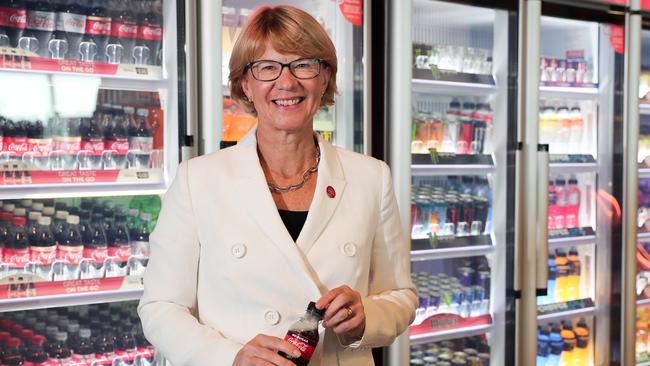
8.26am: Fortescue flags half year profit jump
Fortescue Metals Group said it expects to record a net profit of between $US4.0 billion and $US4.1 billion for the first half of its fiscal year, based on preliminary unaudited management accounts.
The Australian iron-ore mining company, which has been benefiting from a surge in iron-ore prices to a roughly nine-year high, made a net profit of $US2.45 billion in the same period a year earlier.
Fortescue reported the figure in a regulatory filing following a speech by chairman Andrew Forrest in which he said the company made a net profit after tax of more than $US940 million for the month of December 2020.
Fortescue’s half-year results, for the six months through December, are scheduled for release on February 18.
Dow Jones
8.21am: What’s impressing analysts today?
Autosports raised to Overweight: WIlsons
Aventus Group raised to Buy: Jefferies
CSL raised to Buy: Citi
Centuria Office REIT cut to Hold: Jefferies
Charter Hall Retail raised to Buy: Jefferies
Cochlear raised to Neutral: Citi
Coronado Global cut to Hold: Morgans Financial
Incitec cut to Neutral: CS
Mosaic Brands raised to Overweight: Wilsons
Ramsay Health raised to Buy: Citi
Star Entertainment cut to Neutral: CS
South32 cut to Hold: Morgans Financial
Stockland raised to Buy: Jefferies
Transurban cut to Sell: Morningstar
Zip Co cut to Sell: Morningstar
Cleanaway cut to Neutral: Macquarie
PolyNovo cut to Neutral: Macquarie
South32 raised to Neutral: Macquarie
Incitec target price raised 15pc to $3.15; Overweight rating kept: MS
Cluey started at Buy: $1.75 target price: Bell Potter
James Madden 8.15am: Tech giants face the music on news code
The “anti-democratic” practices and unchecked market power of tech giants Google and Facebook will come under intense scrutiny on Friday, with a Senate committee set to demand the digital behemoths explain their refusal to compensate media companies for the content they use.
With the federal government’s news media bargaining code — which is designed to support a diverse and financially sustainable Australian news media sector — due to be voted on in the Senate next month, representatives from Google, Facebook and senior media executives will front the hearing in Canberra to make their final pitches to the panel of cross-party senators.
A host of media companies, including News Corp, Nine, and public broadcasters ABC and SBS, have made submissions to the committee ahead of the hearing, with the news outlets arguing that if they are not adequately remunerated for their content by the digital platforms, the Australian news media industry cannot be sustained.
Liberal senator Andrew Bragg, who is a member of the six-person Senate standing committee conducting the hearing, told The Australian the tech giants would be asked to justify their conduct on a range of media issues.
8.12am: ASX set to open lower
Australian stocks are set to open lower as Wall Street wobbled after worse than expected US jobless claims data.
At around 8am (AEDT) the SPI futures index was down 22 points, or about 0.3 per cent.
Australian stocks closed higher yesterday.
The Australian dollar was higher at US77.60.
Spot iron ore is up 1.0 per cent to $US170.55 a tonne. Brent oil is flat at $US56.10 a barrel and gold futures are also steady at $US1865.90 an ounce.
8.07am: Wall Street ends flat after jobless claims
US stocks gave up afternoon gains as investors’ optimism over stronger-than-expected earnings competed with signs that the labour market is still struggling to recover.
The S&P 500 ended a choppy day up less than 0.1 per cent while the Dow Jones Industrial Average fell 12 points, also less than 0.1 per cent, to 31176.
The Nasdaq Composite performed better, gaining 0.6 per cent, pushed higher by stocks including Apple and Amazon.com.
Despite a turbulent start to 2021, US stocks have largely continued to climb, with all three indexes currently up 2 per cent or more year-to-date. The Nasdaq, in particular, has posted a strong performance, gaining 5 per cent for the year, while the Russell 2000 index of small-cap stocks has risen 8.8 per cent.
Driving some of those gains has been optimism that further economic recovery may be ahead under President Biden’s new administration. Mr Biden has called for a $US1.9 trillion Covid-19 relief plan that includes direct payments to households and more money for testing and vaccine distribution. On Wednesday, the day that Mr. Biden took office, the S&P 500 and the Dow posted their best Inauguration Day performances since 1985, when Ronald Reagan was sworn in for his second term, according to Dow Jones Market Data.
Better-than-expected earnings reports have also buoyed markets recently.
Still, the US economy faces major obstacles, with fresh data showing that about 900,000 Americans filed first-time claims for unemployment benefits for the week ended January 16, as companies continued to lay off workers amid a surge in Covid-19 cases.
Meanwhile, the coronavirus pandemic continues to loom large. The U.S. reported 4,200 deaths for Wednesday, the second-highest daily number ever.
Analysts say those factors -- along with Netflix’s strong earnings this week -- have renewed investor interest for “stay-at-home stocks” that were popular for much of 2020. Technology stocks were bright spots for the market Thursday, with Apple gaining 3.3 per cent. Amazon.com added 1.8 per cent.
Investors are also paying close attention to corporate guidance in the sectors most affected by the pandemic. Shares of United Airlines fell 5.3 per cent after the airliner said late Wednesday it expected the coronavirus to continue to weigh on travel demand this year.
The pan-continental Stoxx Europe 600 added less than 0.1 per cent after the European Central Bank held steady on interest rates.
Dow Jones
6.18am: Maersk ship loses 750 containers overboard in Pacific
A cargo ship operated by A.P. Moller-Maersk A/S lost several hundred containers in the Pacific Ocean while sailing through heavy seas from China to Los Angeles, the latest in a spate of incidents in which boxes carrying millions of dollars’ worth of goods have gone overboard.
The company said the Maersk Essen, which has capacity for more than 13,000 containers, lost an estimated 750 of them on January 16 about halfway through its trans-Pacific sailing from China’s Port of Xiamen.
“All crew members are safe and a detailed cargo assessment is ongoing while the vessel continues on her journey,” Maersk said in a statement on Thursday. “The U.S. Coast Guard, flag state and relevant authorities have been notified. We view this as a very serious situation which will be investigated promptly and thoroughly.” A.P. Moller-Maersk is based in Copenhagen and the ship carries a Danish flag.
Several container ships have lost large numbers of boxes overboard in recent months in a spurt of accidents that maritime industry officials say had been declining.
Dow Jones
6.12am: US stocks waver after jobless claims data
US stocks wobbled as investors weighed optimism over stronger-than-expected earnings against signs that the labour market is still struggling to recover.
The S&P 500 and Dow Jones Industrial Average swung between gains and losses throughout the day. In early afternoon trading both the Dow and the S&P 500 were up 0.1 per cent, while the Nasdaq Composite rallied, gaining 0.6pc, propelled higher by companies including Apple and Amazon.com.
Despite a turbulent start to 2021, U.S. stocks have largely continued to climb higher, with all three indexes currently up 1.8pc or more for the year. The Russell 2000 index of small-cap stocks has risen 8.6pc year-to-date.
Driving some of those gains has been optimism that more economic recovery may be ahead under President Biden’s new administration. Mr. Biden has called for a $US1.9 trillion COVID-19 relief plan that includes direct payments to households and more money for testing and vaccine distribution. On Wednesday, the day that Mr. Biden took office, the S&P 500 and the Dow posted their best Inauguration Day performances since Ronald Reagan was sworn in 1985.
Better-than-expected earnings reports have also buoyed markets recently.
Still, financial markets and the U.S. economy face major obstacles, with fresh data Thursday underscoring that the labour market continues to struggle to recover. The Labor Department said that 900,000 Americans filed first-time claims for unemployment benefits for the week ended Jan. 16, as companies continued to lay off workers amid a surge in COVID-19 cases.
Technology stocks have been among the recipients of investors’ attention lately, a signal that traders remain interested in the same kinds of companies that led stocks out of the pandemic-induced market trough last year. Apple gained 3.1pc Thursday, while Amazon.com added 2.1pc. Snap added 3.5pc.
Supporting markets is the expectation that central banks and governments will step in if financial conditions deteriorate. This has encouraged investors to seek out higher returns, including in overseas markets.
Japan’s Nikkei 225 Index rose 0.8pc Thursday and is trading near its highest level in 30 years. India’s benchmark stock gauge, the S&P BSE Sensex Index, hit a record high Wednesday. Indexes in China and South Korea rallied Thursday, with the Shanghai Composite up 1.1pc and Korea’s Kospi gaining 1.5pc.
Dow Jones Newswires
6.10am: Genetic Technologies shares jump on Covid test results
Shares in Australia’s Genetic Technologies were up 34 per cent to $US5.79 after the company said it saw positive results in the development of its COVID-19 serious disease risk Polygenic Risk Score Test and expansion of its offerings to include Germline Testing division.
Volume for the stock was 46.2 million shares, compared to its 65-day average volume of 1.1 million shares. The stock traded as high as $US8.18 earlier in the day.
The company said total COVID-19 positive patient data analysed exceeds 5500 following inclusion of further 4000 patients’ data. Analysis confirms that the test is well calibrated, and further datasets will continue to enhance the accuracy and consistency of the algorithm.
Genetic Technologies said it anticipates submission for regulatory clearance via Centers for Medicare and Medicaid Services/Clinical Laboratory Improvement Amendments by the end of the first quarter following final validation process of expanded dataset.
Genetic Technologies also said it was selling 1.25 million American Depositary Shares in a registered direct offering, at a purchase price of $US5.25 per ADS. The closing of the offering is expected to occur on or about Jan. 25.
Dow Jones Newswires
6.02am: European stocks slide after ECB meeting
European stock markets lost steam and slid lower following a meeting by directors of the European Central Bank (ECB).
In Frankfurt, ECB chief Christine Lagarde warned the coronavirus pandemic posed “serious risks” to the eurozone economy as new variants spread quickly and vaccination campaigns stumbled.
ECB policymakers left key interest rates on hold however, and took no fresh action after ramping up their pandemic support last month.
The euro fell in value against the pound, with the British currency buoyed by the UK’s early vaccine rollout, analysts said.
The stronger pound, which briefly hit a 2.5-year high versus the dollar, weighed on London’s benchmark FTSE 100 index, especially on multinationals that record substantial earnings in the US currency.
Europe’s single currency also gained ground against the dollar, and Lagarde emphasised during a press briefing: “We are monitoring very carefully exchange rates.” A stronger euro makes imports cheaper, keeping a lid on consumer prices and inflation, while exports become less competitive, hurting growth prospects.
But at the end of the day, UniCredit research chief Marco Valli remarked that the ECB’s “foreign exchange rhetoric did not change, confirming that the euro has not yet approached the GC’s (governing council’s) pain threshold.”
London closed down 0.4 per cent, Frankfurt edged down 0.1 per cent and Paris lost 0.7 per cent.
Earlier in the day, Asian stock markets posted solid gains as Biden prepared to unveil plans on tackling the coronavirus crisis.
The Bank of Japan revised its growth outlook upwards for the next two years meanwhile, and maintained its ultra-loose monetary policy while noting it was hard to establish clear forecasts owing to the pandemic.
AFP
6.00am: Pandemic poses ‘serious risks’: ECB
European Central Bank chief Christine Lagarde warned that the pandemic still poses “serious risks” to the eurozone economy as concerns grow about new virus variants and sluggish vaccination campaigns.
The Frankfurt institution’s governing council held back from tweaking its ultra-loose monetary policy at its first meeting of the year, having already topped up support in December.
Lagarde stressed that “ample monetary stimulus” remained essential to steer the 19-nation currency club through the COVID-19 upheaval, and that the ECB stood ready to do more as needed.
“The pandemic continues to pose serious risks to public health and to the euro area and global economies,” Lagarde told an online press conference.
The start of mass vaccination drives in the European Union was “an important milestone”, she said, but the rollout has got off to a bumpy start in many nations.
The emergence of more contagious virus variants, first discovered in Britain and South Africa, has added to nervousness at a time when many countries are already struggling to bring down infection numbers.
Europe’s top economy Germany this week extended its partial lockdown until February 14, and Chancellor Angela Merkel has not ruled out border checks to slow the spread of the new strains.
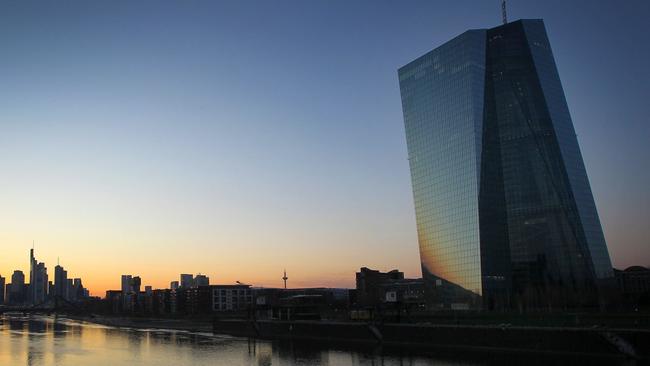
France and Spain have tightened their evening curfews, while non-essential shops and leisure facilities are closed across much of the continent.
The latest virus setbacks “are disrupting economic activity,” Lagarde said, noting that the services sector was hit especially hard.
“The intensification of pandemic poses some downside risks to the short-term economic outlook,” she added.
The ECB in December forecast 3.9 per cent growth for 2021, after an estimated contraction of 7.3 per cent in 2020.
Lagarde said the ECB’s forecasts “remain valid” for now, as they took into account lockdowns persisting through the first quarter coupled with a gradual start to vaccinations.
The former French finance minister also reiterated her plea for European governments to support the ECB’s efforts through fiscal policy.
AFP
5.55am: KLM to cut up to 1000 more jobs
Dutch airline KLM will shed between 800 and 1000 more jobs as the coronavirus pandemic is hitting the aviation business for longer than expected, the carrier said.
The job losses announced in a statement by the airline, which is part of the Air France-KLM group, come on top of 5000 lay-offs that were already announced in July.
“The reality is that the recovery is taking considerably longer than expected, especially for long-haul destinations, partly due to ongoing and new international restrictions and travel restrictions,” KLM said in a statement.
“This means that KLM will have to cut another 800 to 1000 jobs.” The jobs cover 500 cabin crew, 100 flight crew and between 200 and 400 ground crew.
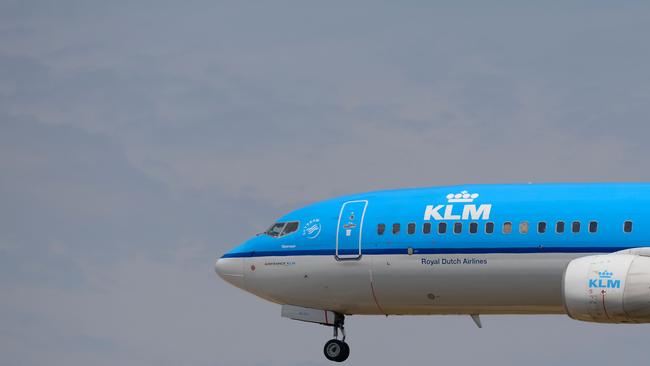
AFP
5.50am: US jobless claims worse than expected
The United States saw 900,000 new filings for unemployment benefits last week, the Labor Department, a massive number that shows the economy remains far from healed as President Joe Biden takes office.
The seasonally adjusted figure for the week ended January 16 was worse than expected and just 26,000 less than the previous week’s downwardly revised level.
It was also still well above the single worst week of the 2008-2010 global financial crisis, during which Biden served as vice president under Barack Obama.
Adding to the toll were 423,734 new filings made under a program for self-employed people not normally eligible for benefits, while as of the week of January 2, the Labor Department said nearly 16 million people were receiving some form of aid from the government -- a figure that’s expected to rise.
AFP
5.45am: ECB’s Lagarde sees ‘downside risks’ to outlook
European Central Bank president Christine Lagarde said the pandemic still posed risks to the eurozone economy, as concerns grow about new virus variants and extended lockdowns in many countries.
“The intensification of the pandemic poses some downside risks to the short-term economic outlook,” Lagarde told reporters after the bank’s governing council left the ECB’s pandemic stimulus unchanged.
Ms Lagarde also said the ECB is closely watching the recent appreciation of the euro against the dollar and its dampening impact on already weak eurozone inflation.
“On the strength of the euro, let me tell you that we are monitoring very carefully exchange rates,” she told reporters. “We are very attentive, and all instruments can be adjusted and all instruments are on the table.” A stronger euro makes imports cheaper, keeping a lid on consumer prices and inflation, while exports become less competitive, hurting growth prospects.
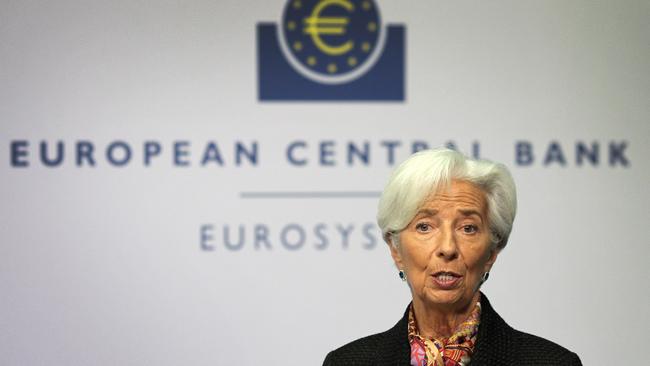
AFP
5.40am: ECB sits tight as virus jitters grow
European Central Bank governors held back from tweaking their pandemic stimulus for the eurozone, even as concerns about new virus variants and slow vaccination drives darken the economic outlook.
Having already ramped up support in December, the 25-member governing council announced no changes to its ultra-loose monetary policy.
The ECB last year took unprecedented steps to cushion the economic impact of the COVID-19 crisis on the eurozone.
Its biggest weapon is a pandemic emergency bond-buying scheme, known as PEPP, that was in December topped up by 500 billion euros to reach a total envelope of 1.85 trillion euros. The scheme was also extended to March 2022.
In Thursday’s statement, ECB governors introduced a sentence saying the envelope “need not be used in full” if financing conditions remain favourable, but that it also could be “recalibrated” if required.
As expected, the Frankfurt institution held key rates at historic lows, including a deposit rate of minus 0.5 per cent -- meaning banks pay to store excess cash with the ECB.
Policymakers also made no changes to their ultra-cheap bank loans, and are continuing their monthly pre-pandemic asset purchases to the tune of 20 billion euros.
AFP


